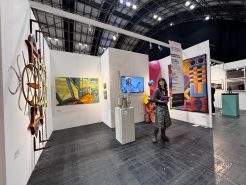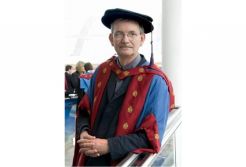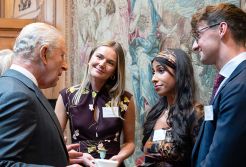£10 million project explores "Internet of Things"
8 December 2015
Manchester to become a demonstrator city with Government grant
MANCHESTER Metropolitan University is proud to be part of a £10m investment from The Department for Culture, Media and Sport (DCMS) to demonstrate the Internet of Things in Manchester City Region.
The CityVerve Project aims to test better services using the Internet of Things (IoT) technology. It includes plans for talkative bus stops, which let bus operators know when commuters are waiting, and a network of sensors in parks and along commuter routes to encourage people to do more physical activity.
The Internet of Things adds sensors and data analysis to equipment like streetlamps, vehicles or home heating equipment. These ‘smart’ improvements will help deliver more personal, efficient and flexible products and services.
The collaborative research and development project will draw on expertise from the School of Architecture (Manchester School of Art) and the Department of Computing and Mathematics (Faculty of Science and Engineering).
Profound effect
Professor Malcolm Press, Vice-Chancellor of Manchester Metropolitan University, said: “The CityVerve project is a fine example of how research at Manchester Met is having a profound effect on the world we live in.
“As a Demonstrator City, Manchester has the opportunity to inspire the country to show how smart city technology can have a lasting impact on our lives, from supporting people’s healthcare needs to improving infrastructure.
“Manchester Metropolitan University’s pioneering work in community engagement, citizen participation and energy management is an important part of this project. As a University, we are proud of our tradition of working alongside public bodies and private businesses to improve the world in which we educate our students.
“Working alongside our partners, we will engage the people of Manchester in the future of our city.”
Benefitting society
Professor Tom Jefferies, who led the Manchester Met bid, said: “Ultimately, our research aims to make the future better. From a university perspective, this allows us to explore how technology can benefit society by working with some great partners from Manchester City Council, industry and SMEs in the city.”
Announcing the winner of the funding, Digital Economy Minister Ed Vaizey said: “I’m delighted that the CityVerve Project is the winner of our Internet of Things Cities competition. The Project will bring real benefits to people who live and work across Manchester, one of our Northern Powerhouse cities.
“The UK’s tech sector is renowned for its creativity as well as pioneering research and development. The Manchester project will help the UK to be a world leader in the adoption of Internet of Things technologies and inspire others around the world to create smarter cities.”
There are 20 partners who formed the consortium.
Future vision
Manchester Met will have three researchers involved – two from the Manchester School of Art looking at the ‘Culture’ strand of the bid and one from the Department of Computing and Mathematics exploring ‘Energy’ use cases.
The overall project has four use cases that focus on culture, community engagement and citizen participation in the public realm. Ulysses Sengupta will lead the research activity from the faculty of Art and Design, building on the work of CPU (Complexity Planning & Urbanism) which he runs with Rob Hyde. The focus will be on engaging citizens in the possible futures of their city based on the Internet of Things. They will research the future growth of the corridor along trajectories of energy, culture, health and transport and examine how these affect the built environment, the urban realm and the lives of citizens.
Through examination of past and current IoT enabled urban data and the design of multiple digital interfaces related to IoT, citizen engagement with the city will be enhanced. . ‘Future vision’ platforms will raise awareness and anticipation about ‘what happens next’ as a result of existing activities and initiatives along the corridor. The digital interfaces will inform, engage and allow citizens to participate in the possible futures of an IoT enabled city and to comment on the future directions of their city as a whole.
Bamidele Adebisi and Liangxiu Han will supervise research in the fields on Energy management in ‘legacy’ buildings and ‘nearly-new’ buildings working with partners Spica Tech, Prism Tech and Asset Mapping to demonstrate a whole-building IoT solution to monitor and control building energy consumption. The project will explore how IoT can improve energy efficiency of buildings and measure occupancy behaviour by building a sensor-linked adaptive building energy system for energy management in the Manchester Met campus.
Working alongside the estates team, led by Dr. John Hindley, this over-arching system will apply to both legacy and new buildings and improve efficiency by better space usage, occupancy detection and energy consumption.



